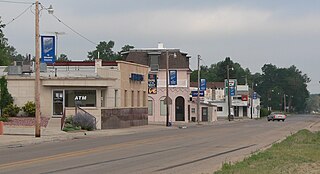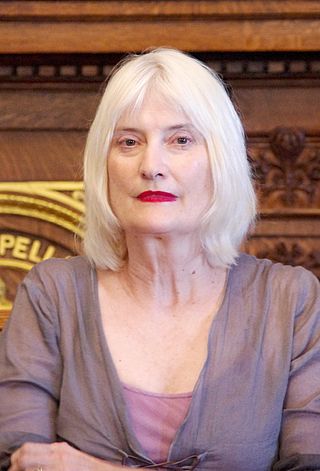Related Research Articles

Hyannis is a village in Grant County, Nebraska. The population was 165 at the time of the 2020 census. It is the county seat of Grant County. It is centrally located in the extensive, unique, and remote region of grasslands known as the Sandhills of Nebraska at the intersection of two Nebraska State Highways: NSH 61 which runs north and south, and NSH 2, which runs east and west.
John Gneisenau Neihardt was an American writer and poet, amateur historian and ethnographer. Born at the end of the American settlement of the Plains, he became interested in the lives of those who had been a part of the European-American migration, as well as the Indigenous peoples whom they had displaced.

Avital Ronell is an American academic who writes about continental philosophy, literary studies, psychoanalysis, political philosophy, and ethics. She is a professor in the humanities and in the departments of Germanic languages and literature and comparative literature at New York University, where she co-directs the trauma and violence transdisciplinary studies program. As Jacques Derrida Professor of Philosophy, Ronell also teaches at the European Graduate School in Saas-Fee.

George Bird Grinnell was an American anthropologist, historian, naturalist, and writer. Grinnell was born in Brooklyn, New York, and graduated from Yale University with a B.A. in 1870 and a Ph.D. in 1880. Originally specializing in zoology, he became a prominent early conservationist and student of Native American life. Grinnell has been recognized for his influence on public opinion and work on legislation to preserve the American bison. Mount Grinnell in Glacier National Park in Montana is named after Grinnell.
Gerald David Shapiro was an American writer who had published three prize-winning books and was Cather Professor of English at the University of Nebraska. He was also a reader for Prairie Schooner. He lived in Lincoln, Nebraska with his wife, the writer Judith Slater.

This timeline of the American Old West is a chronologically ordered list of events significant to the development of the American West as a region of the continental United States. The term "American Old West" refers to a vast geographical area and lengthy-time period of imprecise boundaries, and historians' definitions vary. The events in this timeline occurred primarily in the portion of the modern continental United States west of the Mississippi River, and mostly in the period between the Louisiana Purchase in 1803 and the admission of the last western territories as states in 1912 where most of the frontier was already settled and became urbanized; a few typical frontier episodes happened after that, such as the admission of Alaska into the Union in 1959. A brief section summarizing early exploration and settlement prior to 1803 is included to provide a foundation for later developments. Rarely, events significant to the history of the West but which occurred within the modern boundaries of Canada and Mexico are included as well.

John Frederick Christgau was an American author of fiction and non-fiction.
James W. Sire was an American Christian author, speaker, and editor for InterVarsity Press.

U.S. Highway 20 is a part of the United States Numbered Highway System that runs for 3,365 miles (5,415 km) from Newport, Oregon to Boston, Massachusetts. Within the State of Nebraska it is a state highway that begins on the Wyoming–Nebraska state line west of Harrison near the Niobrara River and runs to the Nebraska–Iowa state line in South Sioux City. Throughout its 431.60-mile (694.59 km) length the route passes through a diverse range of landscapes including bluffs and escarpments in the Northwest Panhandle, the Nebraska Sandhills in the northern part of the state, and rolling hills and plains as the highway approaches the Missouri River valley south of Sioux City, Iowa. Throughout its length, US 20 is a two-lane highway with the exception of the easternmost 8.45 miles (13.60 km) which is four-lane divided highway, the last 3.21 miles (5.17 km) of which is concurrent with Interstate 129. The 197 miles (317 km) between the Wyoming border and Valentine is designated as the Bridges to Buttes Byway, one of nine scenic byways in the state of Nebraska.

Whitman is an unincorporated community in northeastern Grant County, Nebraska, United States. It lies along Nebraska Highway 2, east of the village of Hyannis, the county seat of Grant County. The University of Nebraska-Lincoln Gudmundsen Sandhills Laboratory lies just north of the community. Although Whitman is unincorporated, it has a post office, with the ZIP code of 69366.
Joy Castro is the award-winning author of the recently published novels, One Brilliant Flame, and Flight Risk, a finalist for a 2022 International Thriller Award; the post-Katrina New Orleans literary thrillers Hell or High Water, which received the Nebraska Book Award, and Nearer Home, which have been published in France by Gallimard’s historic Série Noire; the story collection How Winter Began; the memoir The Truth Book; and the essay collection Island of Bones, which received the International Latino Book Award. She is also editor of the craft anthology Family Trouble: Memoirists on the Hazards and Rewards of Revealing Family and the founding series editor of Machete, a series in innovative literary nonfiction at The Ohio State University Press. She served as the guest judge of CRAFT‘s first Creative Nonfiction Award, and her work has appeared in venues including Poets & Writers, Writer's Digest, Literary Hub, Crime Reads, The Rumpus, Ploughshares, The Brooklyn Rail,Senses of Cinema, Salon, Gulf Coast,Brevity, Afro-Hispanic Review,Seneca Review, Los Angeles Review of Books, and The New York Times Magazine. A former Writer-in-Residence at Vanderbilt University, she is currently the Willa Cather Professor of English and Ethnic Studies at the University of Nebraska-Lincoln, where she directs the Institute for Ethnic Studies.

Terese Svoboda is an American poet, novelist, memoirist, short story writer, librettist, translator, biographer, critic and videomaker.

Christopher Merrill is an American poet, essayist, journalist and translator. Currently, he serves as director of the International Writing Program at the University of Iowa. He led the initiative that resulted in the selection of Iowa City as a UNESCO City of Literature, a part of the Creative Cities Network. In 2011, he was appointed to the U.S. National Commission for UNESCO.
Connie Wanek is an American poet.

Paule Constant is a French novelist.

The following works deal with the cultural, political, economic, military, biographical and geologic history of pre-territorial Wyoming, Wyoming Territory and the State of Wyoming.
James C. Olson was an American historian, educator and school administrator; he was president of the University of Missouri System. He had been a vice chancellor at the University of Nebraska and chancellor at University of Missouri-Kansas City.

Gheorghe Buzatu was a Romanian historian, politician, and professor of history at the University of Iași. Elected to the Romanian Senate for Iași County in 2000 on the lists of the nationalist party Greater Romania Party, he served as a vice president of that body over the next four years. He is best known for his controversial publications about the Jews and the Holocaust in Romania during World War II.

The following works deal with the cultural, political, economic, military, biographical and geologic history of pre-territorial South Dakota, the southern part of Dakota Territory and the State of South Dakota.

Angela Stachowa was a German-Sorbian writer and politician. She received the Domowina Art Prize, the City of Leipzig Art Prize (1986) the OIRT radio play prize, and the Johann Gottfried Herder Medal.
References
- ↑ "Private Way". Nebraska Press. Retrieved 2022-01-24.
- ↑ "Haven's Wake". Nebraska Press. Retrieved 2022-01-24.
- ↑ "A Sandhills Ballad". Nebraska Press. Retrieved 2022-01-24.
- ↑ "This Is Not the Tropics". Nebraska Press. Retrieved 2022-01-24.
- ↑ "Leaving the Pink House | University of Iowa Press". www.uipress.uiowa.edu. Retrieved 2022-01-24.
- ↑ "Home". www.randolphlundine.com. Retrieved 2022-01-24.
- ↑ "About". Ladette Randolph. Retrieved 2022-01-24.
- ↑ "Nebraska Book Award Winners - Nebraska Center for the Book". centerforthebook.nebraska.gov. Retrieved 2022-01-24.
- ↑ "Winner, Ladette Randolph". RJF. Retrieved 2022-01-24.
- ↑ "About". Ladette Randolph. Retrieved 2022-01-24.